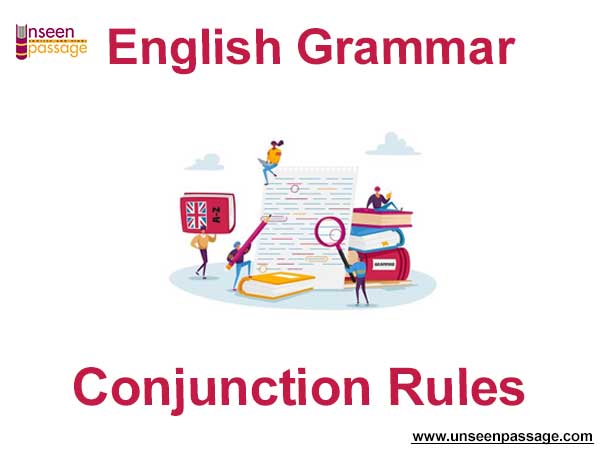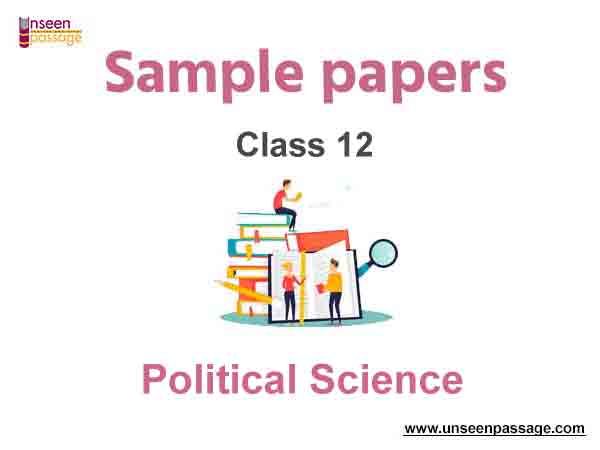Conjunction Rules English Grammar
Students should refer to the following Conjunction Rules of English Grammar. These rules have been designed by expert English teachers to help students appearing in English Exams in schools or competitive examinations. You should remember the following Conjunction Rules so that you can use them correctly and score good marks in examinations. You should refer to all Rules of English Grammar provided by us to strengthen your understanding.
Conjunction Rules English Grammar
Rule 1- when ‘along with’, ‘as well as’, ‘together with’ , ‘No less than’, ‘In addition to’ and ‘Not’ and ‘with’ join two subjects, the verb will be as per the first subject.
• Ex.-Sonu, as well as his Five friends, are present. (Incorrect)
• Sonu, as well as his five friends, is present. (Correct)
Rule 2- If two subjects are joined by ‘Either-Or’, ‘Neither-Nor’, the verb must be according to the subject that is near.
• Ex.-Either Hrithik or I are to do this project. (Incorrect)
• Either Hrithik or I am to do this project. (Correct)
• Neither he nor his friends is swimming. (Incorrect)
• Neither he nor his friends are swimming. (Correct)
Rule 3- ‘One of’ is always followed by a plural noun.
• Ex.-It is one of the beautiful day in her life. (Incorrect)
• It is one of the beautiful days in her life. (Correct)
Rule 4- Usage of (Not only – but also). It is used in various situations
• Brijesh is not only wise but also intelligent.
(Here one person – two qualities)
• Not only India but also Bangladesh is developing.
(Here two persons – common quality)
When two subjects are joined by (Not only-but also) the verb must agree with the ‘second subject. Ex:-
• Not only the players but also the coach are playing. (Incorrect)
• Not only the players but also the coach is playing. (Correct)
Rule 5- ‘Though’ is always followed by ‘yet’ and not by ‘but’. For Eg-
• Though he is poor but he is honest (Incorrect)
• Though he is poor, yet he is honest. (Correct)
Rule 6- ‘Scarcely’ and ‘Hardly’ are followed by ‘WHEN’ and not by ‘THAN’ . Ex-
• I had Scarcely entered the theatre WHEN the light went off.
• Hardly had he seen his mother when he stopped drinking.
• Hardly had he reached the auditorium when it began to rain.
Rule 7- ‘No sooner’ is always followed by ‘than’. Ex-
• No Sooner had I reached the airport than the plan took off.
Rule 8- ‘Lest’ must always be followed by ‘should’. Ex-
• Work hard lest you will fail. (Incorrect)
• Work hard lest you should fail. (Correct)
Rule 9- ‘Such’ is always followed by ‘As’.
• Ex.-Such a boy as I know is at the party.
He is Such a writer as everybody should read his books
Rule 10- ‘So’ is always followed by ‘That’. Ex:-
• He is so intelligent that he can clear any exam in first attempt.
Rule 11- ‘Until’ denotes time. It has a negative meaning and thus ‘not’ must never be used with it. Ex:-
• Wait here until I do not return (Incorrect)
• Wait here until I Return.(Correct)
Rule 12- ‘UNLESS’ denotes a condition, It is always used in the negative sense. Thus ‘NOT’ is never used with ‘unless’. Ex:-
• Unless you do not work hard, you will not pass (Incorrect)
• Unless you work hard you will not pass (Correct)
Rule 13- ‘Since’ shows a point of time and ‘for’ stands for the length of time.
• Ex.-He had been reading this novel for two hours.
• He has been working on this project since 1990.
Rule 14- ‘As if’ is used to denote the sense of pretension.
When ‘as if’ is used in this way, ‘were’ is used, Even with third person singular.
• Ex.-He behaves as if he was king. (Incorrect)
• He behaves as if he were a king (Correct)
Rule 15- ‘BOTH’ is followed by ‘AND’ not (as well as, but)
• Ex.-Ram is both tall and handsome.
Rule 16- Use of (Since, Because, For, As). Ex:-
• It has been a year since I met her
• Since he is my father, I respect him.
• I respect him because he is my father.
• As he is my neighbor, I respect him
• As he was not feeling well, he did not eat anything
Rule 17- ‘OR’ is used to introduce an alternative.
• Ex.-Do or die.
• Stay as it is or leave this place.
OR’ is used to mean ‘otherwise’
• We must hasten or night will overtake us.
OR is used to show several Alternatives
He may study maths or chemistry or Biology or he may enter into trade
Rule 18- ‘WHILE’ IS USED TO MEAN-
(i) During the time that, as long as
• While there is hope there is life.
• While he was sleeping, an enemy entered in the house.
(ii) At the same time that
• The girl sang while the boys danced
Rule 19- ‘ONLY’ as a conjunction means-Except that
• Ex.-A very pretty woman, only she squints a little


